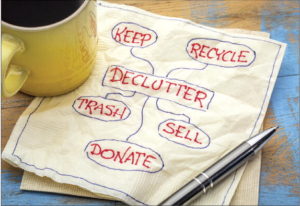- Starting with paper. Unless your only clutter problem is paper, don’t use paper as your starting point. You want to be able to see results quickly, to stay motivated and paper organizing takes more time with less visible results.
- Believing that the perfect container (or shelf, or storage system) will solve your organizing problem. Going out and buying furniture, containers or other organizing products should happen near the end of the organizing process, after you’ve purged what you no longer love, use or need. Otherwise you can end up with the wrong solution or more clutter masking as bins, boxes and containers.
- Using your vacation time to declutter. Decluttering is hard work. Why would you spend your hard earned vacation time to work again? Instead, set aside a time where you would normally take care of household tasks, a weekend morning for example or during the week if your schedule permits.
- Stopping to decide the “perfect” recipient for an unwanted item. When it comes to organizing, perfection is definitely the enemy of progress. If you decide you don’t want something just put it aside in a “giveaway” or “donate” pile and keep going. If you don’t have someone specific in mind for that “gift” then either keep it for yourself or donate it.
- Keeping things just because someone important to you gave it to you as a gift. Guilt is not an organizing system. If you don’t love it, would never use it or wouldn’t buy it for yourself, don’t keep it. Keeping an item that takes up valuable space in your home simply because it came as a gift, does not honor the relationship you have.
- Diving in without preparing first. Have a plan. Set a time limit – organizing can be tiring and dehydrating – and gather your supplies before you begin. I suggest starting small. You can make great progress and feel accomplished in as little as 10 minutes.
- Confusing organizing with decluttering. Decluttering happens when you have more stuff than you have space. It’s a real estate issue. Decluttering is one step in the organizing process. Before tossing anything, it helps first to group like items together to help you decide on how much you need. Knowing what you have and how much space it takes up will help you decide how to contain it and where it should “live” in your home.
- Keeping something just because it’s “useful” or because you may use it some day Almost anything is usable: Empty toilet paper rolls, plastic shopping bags, old jars or containers without lids are all “useful” but that doesn’t mean you are obligated to use them.
- Being unwilling to let it go because it cost you so much when you bought it. Unless you know it has current market value, in which case you can decide whether or not to sell it, then keeping it will never get you that money back. Decide if it’s worth your time to learn it’s real value. Otherwise give it new life somewhere else.
- Making your stuff more important than the people in your life, yourself included. Almost everything is replaceable except the people you love or who love you. If your stuff is pushing you or your loved ones further away, perhaps it’s time to consider the help of professionals. Most of all, if what it takes to keep you safe, secure and healthy means your family must separate you from your things, keep in mind what their intentions are and find a way to forgive them.
- Not knowing what to consider to help you make decisions. Clutter is the result of deferred decisions. Consider asking yourself any of these questions when you feel stuck in indecision.
- Do I love it or does it bring me joy?
- Is it something I use, or plan to use in the next 12 months?
- If it disappeared, would I miss it?
- If I saw it in a store would I buy it?
- Does it evoke positive memories or negative emotions.?
- Is it mine to decide about?
- Have I made this item more important than me or my family?
Photo courtesy of East Bay Times


